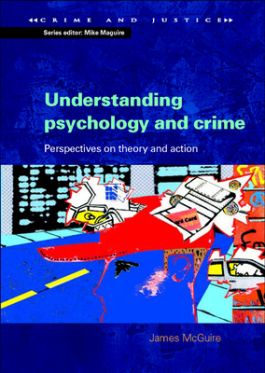Understanding Psychology and Crime
Receive via shipping:
- Colour, print bound version of the complete text
Why psychology?
Accounting for crime
Psychological processes in crime
Pathways to offending behaviour
Individual factors in crime
Preventing and reducing crime
Crime and Punishment: a psychological view
Applications and values
Glossary
Index.
Dr Ralph Serin, Carleton University, Canada
"James McGuire is one of the leading international experts on what works in reducing reoffending, and he has written an extremely valuable and accessible textbook on psychology and crime. The book is a clearly written, well-researched and up-to-date survey of important contributions of psychology to key criminological issues. It is especially noteworthy for its illuminating reviews of cognitive-social learning theories, risk factors and longitudinal studies, risk assessment, cognitive-behavioural programmes and meta-analyses of treatment effectiveness."
Professor David Farrington, Institute of Criminology, University of Cambridge
- What contributions can psychology make to our understanding of crime?
- How can psychological models and research help to prevent crime and reduce repeat offending?
McGuire argues for a broader understanding of crime, based on factors such as the individual’s cognitive and emotional development, in addition to the influences of socialization, peer groups, and the social and economic environment. He highlights the value of understanding ‘pathways’ to offending behaviour, and the critical points at which choices are made. Topics include:
- Theoretical and empirical research foundations of ‘criminogenic risk factors’
- Theory turned into practice – the development of offending behaviour programmes
- A psychological perspective on some core concepts in criminology: retribution, deterrence and incapacitation
- Major practical applications of psychology in policing, prosecution and sentencing

